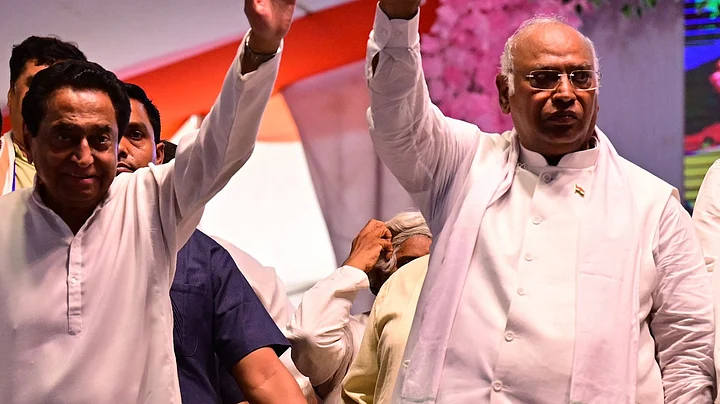With the BJP and the Congress announcing candidates for almost all seats in Madhya Pradesh (MP), the state is set to witness a cracker of a contest.
The Congress, through the caste census promise in its manifesto, is trying to heat up OBC (Other Backward Class) politics in the state.
MP, which has a 50 percent OBC population, has not been a hotbed of OBC politics like the Hindi heartland states of Uttar Pradesh, Bihar, and Rajasthan.
Even in the post-Mandal era, when all these states installed a OBC Chief Minister, the Congress in the state backed a Thakur, Digvijay Singh, who ruled for a decade from 1993 to 2003.
There is No Dominant OBC Caste in MP
OBC politics came to the forefront in MP in 2003 when BJP made Uma Bharti, from the Lodhi community, its CM, following it up with Babulal Gaur (Yadav) and Shivraj Singh Chauhan (Kirar). However, representation in the cabinet (maximum one-third), and ticket distribution (27 percent to 30 percent) has not been in line with its population.
Not only that, MP has only 14 percent reservation for OBCs in state government jobs and institutions, which is almost half of 27 percent as mandated by the Constitution.
Protests by sub-caste OBC groups, like Jats in Rajasthan and Haryana, Marathas and Patidars in Maharashtra and Gujarat, are unheard of in MP. OBC groups have not come out on the streets to demand their rightful share.
This is partly because there is no dominant OBC caste in MP like the Jats, the Yadavs, or the Vokkaligas. The bigger OBC groups like Yadavs, Kurmis, Kushwahas, Lodhis, etc. are not more than 5 to 6 percent of the population.
MP doesn’t have any regional party representing OBCs unlike SP of UP, RJD of Bihar, INLD of Haryana. Since there is no dominant OBC caste, there is no upper versus lower OBC politics in the state like Yadavs vs non-Yadavs in UP and Bihar.
This shows why there is no spotlight on the OBC vote. Upper castes continue to dominate state politics and the cabinet, except the CM chair. While Congress has given tickets to 62 OBC candidates (27 percent), BJP has given tickets to only 68 (30 percent) of them.
Contrastingly, the Congress and the BJP have given tickets to 80 and 79 upper caste candidates respectively, 35 percent of the total seats, which is almost double their population.
On the basis of seat distribution, there is an OBC versus general candidate contest in 53 seats and an OBC versus OBC candidate in 37 seats. The OBCs are in contention in 39 percent of the seats, and the general category candidates in 48 percent of the seats.
Ticket Distribution: Jitni Adbadi Utna Haq?
The OBCs have been largely backing the BJP, rewarding the party for making one of their own the CM. Congress managed to close the gap in 2018 to 7 percent from 14 percent in 2008. However, in the 2019 Lok Sabha elections, the Modi factor helped BJP get two-thirds support amongst the OBCs.
Despite this support and an OBC CM, the BJP never initiated steps to increase OBC reservation to 27 percent. MP has a 50 percent OBC population as per the Mahajan Commission.
This issue came to the forefront during the 2018 state elections. The Congress government led by Kamal Nath passed an ordinance to increase OBC reservation from 14 to 27 percent after coming to power, just before the 2019 general elections.
After Shivraj became CM again in 2020 due to a coup led by Jyotiraditya Scindia, the government passed fresh orders to increase reservations to 27 percent in September 2021. However, this has been legally challenged and stayed by the High Court.
During one of the hearings in the matter, the state government reiterated in the High Court that OBCs constitute about 51 percent of the state's population.
The Congress has given a slogan of jitni adbadi utna haq (rights proportionate to the population).
However, the number of OBC candidates shows it has not implemented this in its ticket distribution. While winnability may have forced this decision, it is very important for the Congress party to be seen as having OBC leadership in the state.
This becomes even more important given that the top two Congress leaders in the state - Kamal Nath and Digvijay Singh - belong to the upper caste. 100 odd OBC candidates could have been game changers for the Congress, and it would be seen as living up to its slogan.
Congress supporters could argue that even the BJP has given fewer tickets compared to their population to the OBCs, but they have an excuse, they have an OBC CM at the top, unlike the grand old party.
Did Congress miss a trick here? Only time will tell.
(The author is an independent political commentator and can be reached at @politicalbaaba. This is an opinion piece. The views expressed above are the author’s own. The Quint neither endorses nor is responsible for them.)
